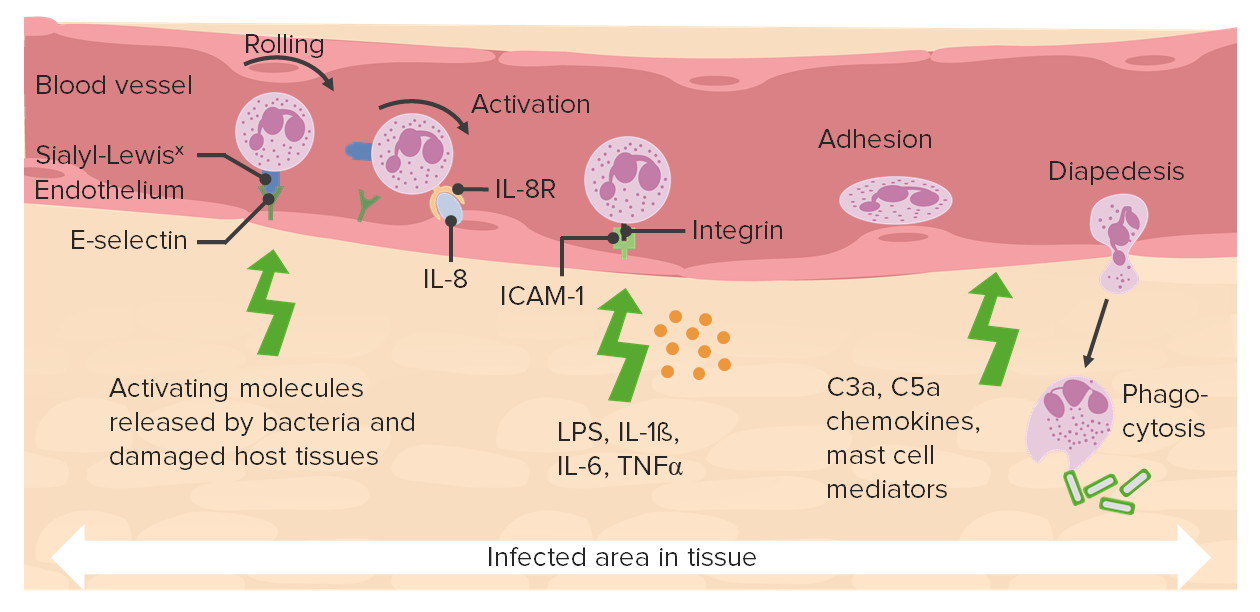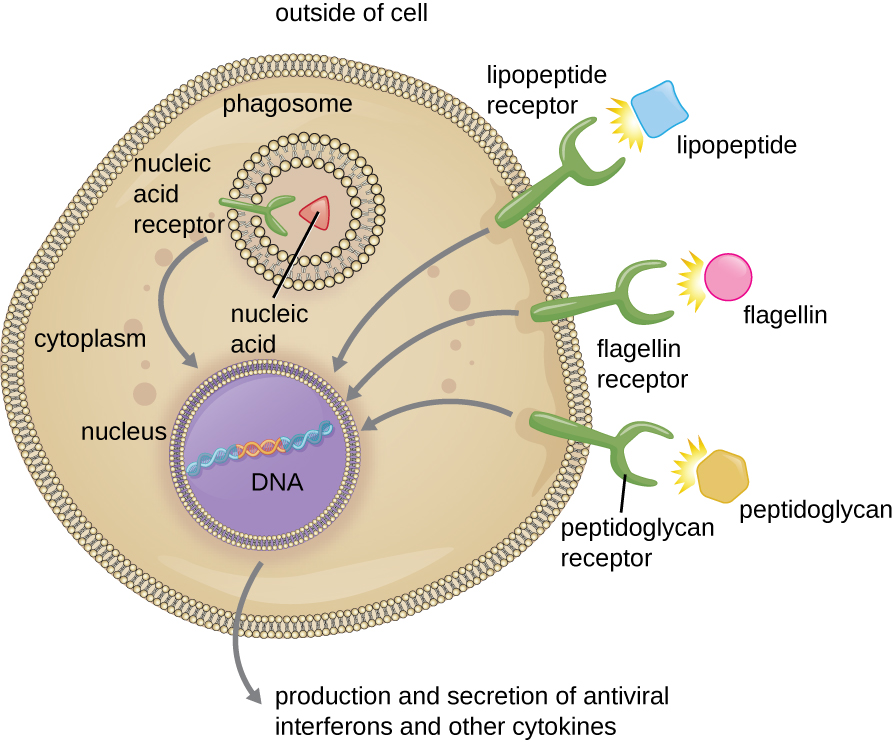Playlist
Show Playlist
Hide Playlist
Chronic Inflammation
-
Slides Innate Immune System.pdf
-
Download Lecture Overview
00:01 So that’s acute inflammation. 00:03 What about chronic inflammation? Well, chronic inflammation occurs when there is a failure to eliminate the stimulus which results in an ongoing inflammatory immune response with a shift away from neutrophil dominance. 00:20 Chronic inflammation can also arise insidiously, without any kind of obvious reason. 00:29 There is a T-cell and macrophage dominance. 00:33 T-cells and NK cells release pro-inflammatory cytokines such as interleukin-17-- so here’s another example of a pro-inflammatory cytokine that you’ve not met yet. 00:45 As well as tumor necrosis factor alpha, and interferon γ. 00:51 And these pro-inflammatory cytokines recruit and activate macrophages. 00:56 And re-macrophage activation is key in chronic inflammation. 01:02 In chronic inflammation, the macrophages become activated by microbial products and cytokines. 01:11 So we can see in this particular example, lipopolysaccharide (LPS) from Gram-negative bacteria together with the cytokines, tumor necrosis factor alpha and interferon gamma are classically activating the macrophage to produce what is referred to as an M1 macrophage, a classically activated M1 macrophage. 01:32 These macrophages have the characteristics of being pro-inflammatory, they perpetuate the inflammatory process and they are also highly phagocytic. 01:43 And they perpetuate the inflammatory process by they themselves releasing pro-inflammatory cytokines, such as tumor necrosis factor alpha, interleukin-12 and interleukin-23. 01:55 And a consequence of the release of these cytokines by macrophages is that they increase the activity of Th1 cells and Th17 cells. 02:08 These are two types of helper T-cells. 02:10 Both of which are involved in chronic inflammation. 02:16 Alternatively, in the presence of cytokines such as interleukin-4, interleukin-13, interleukin-10 and transforming growth factor β (TGFβ), you get M2 macrophages being produced; alternatively activated macrophages. 02:35 And these are anti-inflammatory and are involved in tissue repair, and secrete cytokines such as interleukin-10 and the interleukin-1 receptor antagonist (IL-1RA). 02:49 So these are not directly involved in chronic inflammation. 02:53 They are anti-inflammatory, in contrast to the M1 macrophages that mediate chronic inflammation. 03:01 And whether the macrophage develops into an M1 or an M2 macrophage depends on which cytokines and which microbial products are present. 03:09 So chronic inflammation is associated with tissue damage and the M1 macrophage is important in this process because of several features that are characteristic of M1 macrophages: the production of reactive oxygen species, the production of nitric oxide, the production of proteases and the release of coagulation factors. 03:33 Chronic inflammation contributes towards pathology in many, many, many different diseases. 03:41 And in fact, there’s probably very few diseases where chronic inflammation doesn’t play some role or another. 03:47 To give you just a few examples: rheumatoid arthritis, atherosclerosis, tuberculosis, pulmonary fibrosis, cancer, and Alzheimer disease; just a few examples of diseases where chronic inflammation is key to the disease process.
About the Lecture
The lecture Chronic Inflammation by Peter Delves, PhD is from the course Innate Immune System.
Included Quiz Questions
Classically activated M1 macrophages are generated in the presence of which of the following?
- Interferon-gamma
- Interleukin 4
- Interleukin 10
- Interleukin 13
- Transforming growth factor beta
Which of the following cells is NOT a key component of chronic inflammation?
- Neutrophils
- Macrophages
- T cells
- Plasma cells
- B cells
Which of the following T-helper 2 cytokines are associated with alternatively activated M2 macrophages?
- Interleukin 4, interleukin 13
- Lipopolysaccharides, interleukin 12
- Tumor necrosis factor alpha, interleukin 18
- Interferon-gamma, interleukin 23
- Interleukin 12, interleukin 23
Customer reviews
5,0 of 5 stars
| 5 Stars |
|
1 |
| 4 Stars |
|
0 |
| 3 Stars |
|
0 |
| 2 Stars |
|
0 |
| 1 Star |
|
0 |
I love how he explain things, he's so clear and easy to understand!





